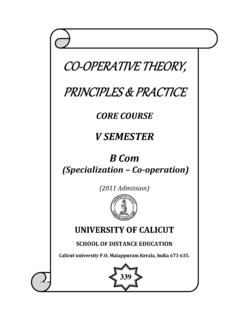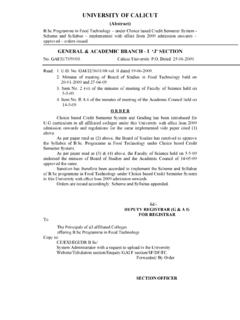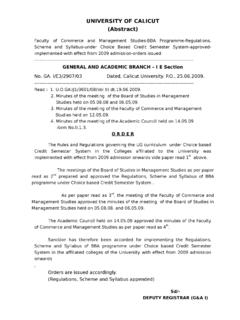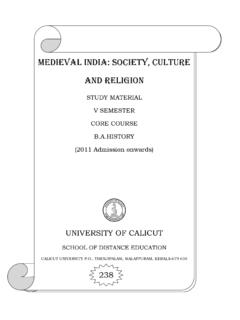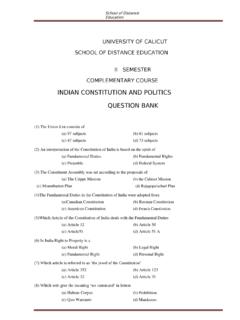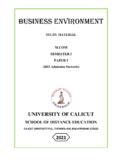Transcription of School of Distance Education - University of Calicut
1 School of Distance EducationDevelopment AdministrationPage1 STUDY MATERIALDEVELOPMENT ADMINISTRATIONForMA POLITICAL SCIENCEPAPER-IXII YEAR(2013 ADMISSION ONWARDS) University OF CALICUTSCHOOL OF Distance EDUCATIONC alicut University , Malappuram,Kerala, India-673 635499-ASchool of Distance EducationDevelopment AdministrationPage2 University OF CALICUTSCHOOL OF Distance EDUCATIONSTUDY SCIENCEPAPER IXDEVELOPMENTADMINISTRATIONII YEARP repared BAssistant ProfessorPG Department of Political ScienceGovernment College by:Dr. G. SadanandanAssociate Professor and Department of Political scienceSree Kerala Varma College, & Settings: Computer Section, SDE ReservedSchool of Distance EducationDevelopment AdministrationPage3 CONTENTSPAGESMODULE-I5-21 MODULE-II22-34 MODULE-III35-45 MODULE-IV46-56 MODULE-V57-69 School of Distance EducationDevelopment AdministrationPage4 School of Distance EducationDevelopment AdministrationPage5 Module 1 Nature and scope ofDevelopment AdministrationDevelopment is the end result of (Public) Administration.
2 The paradigm of development isdepending on the nature of government and its policies. It may be ideologically driven or ethicallymotivated. It strips off the orthodox structuralism of public administration as put forward byclassical Administrative theorists and attempts to cater the emerging need of a given populationupon which the process of administration is going to be taken place. Development Administration isan intellectual enterprise with which defined goals of development can be achieved. Welfare ofpeople, increase in per capita income, empowerment of the marginalised if any, long term projectslike implementation of five year plans, strategies to ensure sustainable development, eradication ofpoverty and mitigation of commoners list may not be completed and the projectsand programmes of government or public authority unquestionably relates to the nature of theiradministration.
3 Development Administration as a theory and model is an article for developmentaldesign of third world to Kempe Ronald Hope Virtually every developmentplan, administrative reform agenda, political party manifesto, Government action plan and majorpolicy speech has come implicitly or explicitly to suggest a preference for the DevelopmentAdministration approach to public management . Unlike the western developed nations third worldcountries resort a state or public purse centred approach for development initiatives. But we cannotgive exclusiveness for development administration as a sole strategy adopted by the third Ronald Hope in his article The Dynamics of Development and Development Administrationhas pointed out three reasons for the development of Development Administration as a newdiscipline as well as an of CAG (The Comparative Administration Group; between 1962-71) headed by FW Riggsand supported by The Ford Foundation of America.
4 Thegroup conducted extensive studies and laterpublished several papers intending to support the third world countries in their socialreconstruction. The administrative problems of developing countries was the concern of the Highly Prescriptive nature of Development Administration. It suggests easy ways toovercome administrative problems on the way of operationalizing administrative an approach the new tendency of development administration demanded administeredsocial change. According toGeorge K. Najjar, (Journal Article :Development Administration and "New" PublicAdministration: A Convergence of Perspectives?) The main thrust of development administrationhas been the study of administrative patterns and behaviour in societies caught in the midst oftransition along the path from rural, agricultural, peasant life toward urban, industrial, and moreadvanced forms; and to devise a set of guidelines potentially helpful in facilitating the process oftransition.
5 Najjar points out the role of Development Administration as an approach to ease thetransitional phase of countries which are caught up in between development andunderdevelopment. In democratic countries it is the conduct of administration in a political of the landmark events in the history of public administration and comparative publicadministration was the Conference on Comparative Administration convened in Princeton, NewSchool of Distance EducationDevelopment AdministrationPage6 Jersey, during September 1952 by the Public Administration Clearing House. There were thirtyscholars, administrative advisers and other executives in the conference. They expressed concernover the changing role of Public Administration across continents. The agenda setting of theconference was .. gave examples of problems that they had confronted about which doctrine andknowledge were lacking, particularly comparatively.
6 Mention was made of the proliferation ofgovernment corporations for agricultural, industrial or financial development in underdevelopedcountries, without understanding of the conditions for their success or the methods of their were the conditions for success or failure of various devices of parliamentary government?Problems of delegation of authority, of budgetary procedures were said to be pressing .Theconference suggested the need for making comparative studies of administration in differentcountries. It was the first attempt to analyse public administration on the contest of a country sspecial Conference declares that PublicAdministration no longer be treated as an ivory-tower theorybut its content and context should be prefixed with the unique social setting on which it is going tobe implemented. Development administration thus becomes a by-product of comparative publicadministration.
7 Comparative public administration studies administrative systems in developed aswell as developing or underdeveloped nations. How to apply the theories of public administration indiffering context of development or underdevelopment, ethnic, cultural, historical, religious,linguistic, or racial backgrounds is the concern of Development Administration. Two types ofadministrative changes are debated in this context. Inter system maintenance and outer systemmodifications. Inter system maintenance means that development of proper organs for runningadministration; that covers reforms in bureaucracy, administrative laws, E-governance etc. Thelatter deals with the impact of administration in society or social changes like improvement ofstandards of living, removal poverty, reduction of inequality, social justice UN division for Public Economics and Public Administration explains the Goals and tasks ofdevelopment administration as:Establishment of welfare state is the most important task of development administration.
8 TheState, and by extending the scope of public administration, would be the engine of welfare state would come about through government's control of the national , governmenttook on several important tasks: centralized economic planning, thepreparation and execution of development programmes and projects, the promotion andmanagement of industrial growth, and meeting the basic needs of citizens through the provision ofsocialservices, economic opportunities and social welfare programmesDevelopment Administration is administration for development purpose. It is a version ofunderdeveloped or developing nations who want to improve themselves using publicadministration. It isan offshoot of comparative public administration. It addresses the need ofsociety and social dynamics. The basic assumption behind development administration is that socialchanges can be initiated or guided by administration machinery.
9 Classical publicadministration waslooking for improvements within the administrative framework while development administration islooking for social change and wants to be a cause for social engineering. Under developing anddeveloping nation s resorts to well configured system of administration to achieve national administration represents the goal oriented or plan based developmental administration was a deviation from traditional meaning of public administration says about the institutional as well as instrumental designs of policySchool of Distance EducationDevelopment AdministrationPage7implementation using well established administrative machinery. Theories and methods developedwithin the ambit of public administration were revolved around the nature of organisation andmanagement with which public policies can be implemented from top to bottom levels of social the other hand Developmental administration has dramatically changed the entire scope ofadministration.
10 It says about larger goals of administration and it has an altruistic or enlightenedrole in the developmental programmes of people. It is a people centred vision and the merit ofdevelopment administration is judged from the point of fulfilment of public policy rather theprocedural clearanceof bureaucratic administration. Public administration adhere principles andprocedures of legal or normative aspects of management. The rational of public administrationeschews policy goals of a democratic government and virtually quite ignorant of its due public administration behaves like an impersonal being with little attention to the broadgoals of concept of Development Administration is a development of the post 1945 term development administration came into use in the 1950s to represent those aspects of publicadministration and those changes in public administration, which are needed to carry out policies,projects, and programs to improve social and economic conditions.
